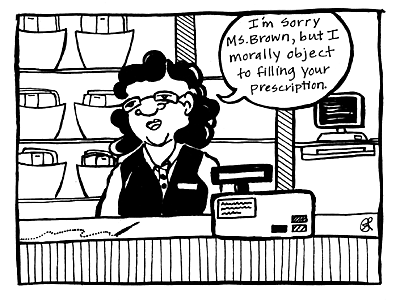
Illustration by Patricia Tompkins
|
|
By David Schultz
Arizona Daily Wildcat
Thursday, November 3, 2005
Print this
To steal a phrase from President Kennedy, Tucsonans sought redress in the streets last week after a pharmacist refused to fill a rape victim’s prescription for emergency contraception because of moral objections.
Picket signs were unfurled in front of the Fry’s pharmacy where the woman was turned away, and one demonstrator was quoted in this newspaper as saying that the victim “was not only raped sexually, but raped by a pharmacist’s religious convictions.”
These are harsh accusations that spring from frustration and anger. But these demonstrators have got it all wrong.
They shouldn’t be protesting against the pharmacist who denied the rape victim contraception. Instead, they should be protesting against the legislators who gave the pharmacist the right to refuse.
Currently, there is no law in Arizona concerning the rights of pharmacists who object to filling a prescription on moral grounds, which is why the pharmacist at Fry’s was able to legally do so.However, seven months ago, the Arizona state Legislature attempted to change this.
In March, the so-called Conscience Bill, introduced by Rep. Doug Quelland (R-Phoenix), was sent to Gov. Janet Napolitano’s desk. It would have shielded any pharmacist who refuses to dispense a medication from legal or disciplinary action.Fortunately, the governor vetoed this ludicrous and detrimental attempt by the Legislature to permit pharmacists to neglect their duties.
The American Pharmacists Association has a code of ethics similar to the Hippocratic Oath, and although it is not a legally binding document, all pharmacists must acknowledge it before they start practicing. It states, “The primary obligation of a pharmacist is to individual patients.”
Because of this obligation, the pharmacist must respect patients’ wishes and needs even if they do not agree. Whether or not a patient should be taking a certain medication is the decision of the patient and their doctor alone, not the pharmacist.
At around the same time Napolitano vetoed the Conscience Bill, another piece of legislation was presented to the U.S. Congress that was similar but had one crucial twist.
The Access to Legal Pharmaceuticals Act (ALPhA), which was introduced by Sen. Frank Lautenberg (D-N.J.) and Rep. Carolyn Maloney (D-N.Y.) and is currently stalled in committee, would allow pharmacists to refuse to fill a prescription as long as they could arrange for the patient in question to get the medication elsewhere.
While more sensitive to patients’ rights, this bill is still no better than the Conscience Bill.
This is because emergency contraception must be taken within 72 hours of sexual intercourse but with every second that passes by, it becomes less effective at preventing pregnancy.
What happens when a woman who needs emergency contraception lives in a small town with only one pharmacist who refuses to dispense it?
If ALPhA is passed, her only options are to wait for the medicine to be shipped in from elsewhere, severely decreasing its effectiveness, or to acknowledge that she’s simply out of luck.
In many cases, access to medication can be a life-or-death scenario. If we allow pharmacists to discriminate based on their own personal views, there will be extremely horrendous consequences, not only for women who need emergency contraception, but also for all patients.
Who’s to say a pharmacist won’t morally object to prescribing cardiac medication or even insulin? Under the Conscience Bill as well as ALPhA, if a patient is harmed because they can’t access their medication, they can’t sue the pharmacist who refused them, nor can the store at which the pharmacist works invoke disciplinary action.
Instead of trying to find loopholes to allow pharmacists to deny patients the medication they were prescribed by their doctors, lawmakers should be passing legislation that forbids all pharmacists from refusing to fill a prescription based on moral or religious objections.
Patients who have been prescribed
medication have a right to that medication, and this right trumps any right a pharmacist has to act on his or her conscience. If a pharmacist doesn’t like this, they should feel free to look for employment in another field.
If, for some reason, a firefighter became unable to climb a ladder or spray a fire hose, he or she would not be able to continue being a firefighter. Similarly, if a pharmacist is for any reason unable to fill any prescription that may come their way, he or she should not be able to be a pharmacist. Period.
David Schultz is a senior majoring in political science and philosophy. He can be reached at letters@wildcat.arizona.edu.
